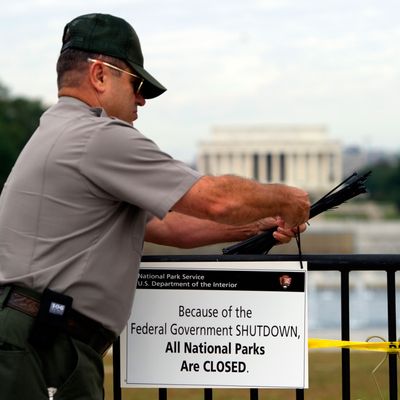
Under the stopgap spending bill passed in September and signed by the president after a deal with his Democratic friends “Chuck and Nancy,” appropriations for nonessential federal spending will expire on December 8. The current GOP plan is to pass another stopgap spending bill that will run for another two weeks (until December 22), at which time they may opt for yet another stopgap spending plan that would take the government into January.
Is that how the deal will go down, or is there some risk of a government shutdown either this week, the week of December 22, or soon thereafter?
There are five key questions whose answers will determine what happens during this potentially perilous series of actions and debates over federal spending. It’s important to keep in mind that any spending bill is subject to a Senate filibuster, so some level of Democratic support is essential. That’s why Chuck and Nancy will continue to matter in these negotiations.
1. Can Republicans and Democrats reach an agreement to give each other what they want on government spending?
The most basic dynamic of the negotiations over appropriations is that Republicans want more defense spending and Democratic want more nondefense spending. Both are currently limited, under a deal struck back in 2011, by “caps” that can be overridden by Congress. In the recent past, additional deals have been struck in which enough members of each party supported the other’s spending priorities to waive the caps and avoid either a government shutdown or a “sequester” (mandatory across-the-board cuts that were part of the 2011 deal). This year Congress may just get rid of the caps once and for all. But whether or not that happens, the two parties will need to agree to scratch each other’s backs, particularly since a decent number of conservatives oppose any deal as a matter of principle.
2. Can Republicans and Democrats limit the spending negotiations to spending, without dragging in extraneous issues?
The most likely reasons for failed negotiations and a government shutdown involve issues not germane to appropriations that one party or the other insists on including, leading either to a rejection of demands or to counterdemands that destabilize the negotiations. If, for example, Republicans went to the mat for “defunding” Planned Parenthood, Democrats would reject the bid and/or demand something a majority of Republicans could not accept. The more issues get caught up in the negotiations, the greater the chance of a shutdown. For example …
3. Will Democrats really demand a DACA agreement to vote for a spending bill? And, if so, when will they make that demand?
The most likely deal-breaker at the moment is a demand by Democrats for an agreement to extend the protections for DREAMers once provided by Barack Obama’s Deferred Action for Childhood Arrivals (DACA) initiative, which was repealed by President Trump in September, with an effective date delayed until March 2018. Five Senate Democrats (Cory Booker, Dick Durbin, Kamala Harris, Bernie Sanders, and Elizabeth Warren) and 25 House Democrats have publicly announced they won’t vote for any spending measure until the repair of DACA has been accomplished. It’s possible that some or all of them will go along with a two-week stopgap, on the grounds that it’s not the real deal, but that’s not what they’re saying now. And while Republicans from the president on down have signaled they are willing to do something for DREAMers before March, Mitch McConnell has adamantly opposed doing it right now. That’s a potential collision that could cause a train wreck, particularly since Trump would love to reassure his “base” that he’s only going to go along with an “amnesty” for DREAMers in exchange for big concessions on the border wall, or other elements of immigration policy.
4. Do Republicans have any non-spending deal-breaker demands of their own?
So far the most prominent non-spending promise Republicans have talked about in conjunction with the spending bill is one they made to one of their own to secure passage of the Senate tax bill: the commitment Susan Collins extorted from both the president and McConnell to support quick passage of two health-care bills that she believes (not very accurately) would offset the tax bill’s repeal of the Obamacare insurance-purchasing mandate. In theory, Democrats might support one of them: the Alexander–Murray legislation reversing Trump’s elimination of the so-called cost-sharing reduction payments to insurers, reimbursing them from subsidies aimed at keeping out-of-pocket expenses down for l0w-income consumers. But it is unclear that Senate Democrats will be willing to consummate an intra-Republican bill without any additional concessions.
5. Who do the two parties believe would lose a government-shutdown blame game?
The conventional wisdom is that, as the party that controls the federal government, the GOP will be largely blamed for any government shutdown. But the president has in the past tweeted about the possibility of a “good shutdown” (that is, good for him politically), and has revived this sort of talk in the last few days, as the Washington Post reports:
President Trump has told confidants that a government shutdown could be good for him politically and is focusing on his hard-line immigration stance as a way to win back supporters unhappy with his outreach to Democrats this fall, according to people who have spoken with him recently.
It’s unclear whether that’s a genuine presidential sentiment or an Art of the Deal–inspired ploy to increase his negotiating leverage. But let’s just say that if enough Democrats are willing to credibly threaten a shutdown over immigration policy, Trump may push his fellow Republicans to bring it on. That would be a big mess if it happened this week. It would produce more than a little national hysteria if it happened three days before Christmas.






























